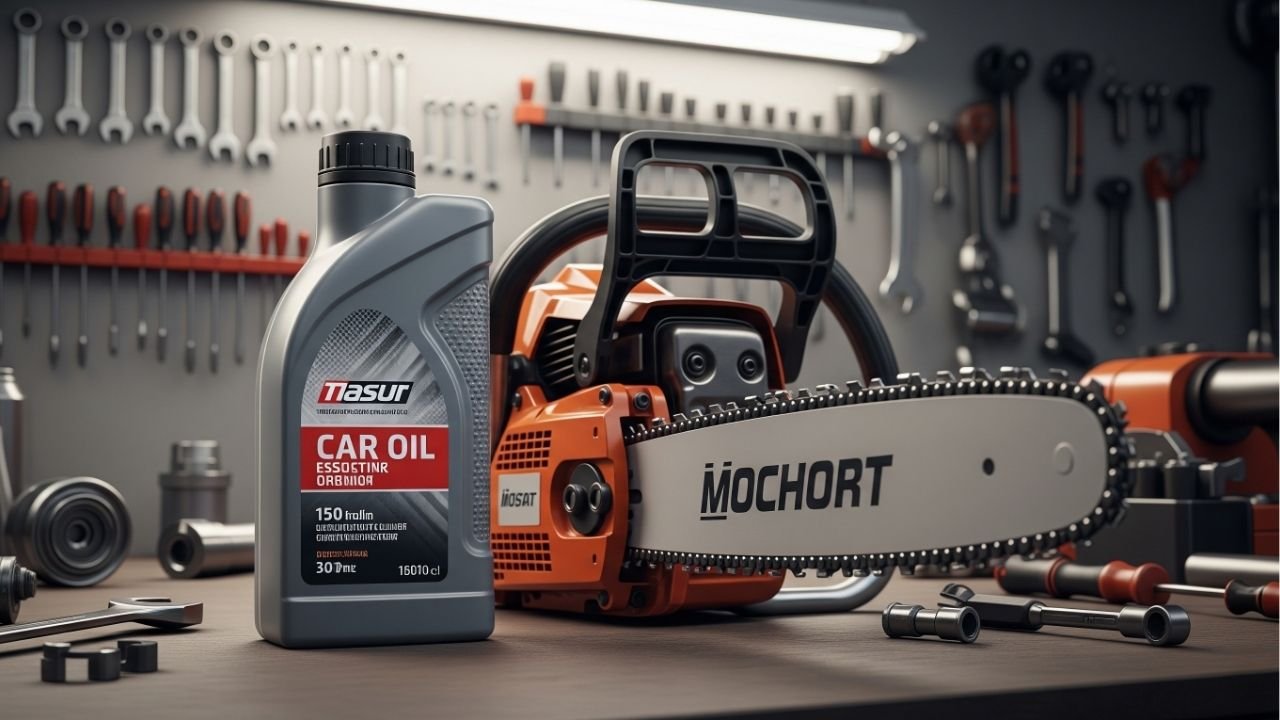Can I Use Car Oil for Chainsaw?

If you’ve ever stood in your garage, chainsaw in one hand and a bottle of car oil in the other, scratching your head and wondering, “Can I use car oil for chainsaw?”, you’re not alone. I’ve been there too. It usually happens when you’re deep into a project—cutting firewood, trimming branches, or tackling a backyard renovation—and you realize you’re out of chainsaw bar oil. The only thing within reach? A dusty jug of used car engine oil from your last oil change.
That moment sparks a cascade of questions. Will it hurt the chainsaw? Will it work just as well? Or am I about to ruin a perfectly good tool to save a few bucks?
In this article, we’re diving deep into this everyday question with a friendly, real-world tone. We’ll unpack the facts, explore personal stories, share professional advice, and help you make a decision that balances safety, budget, and performance. And don’t worry, we’ll keep the technical jargon simple and the sentences short.
Let’s settle this chainsaw oil mystery once and for all.
In This Article
- 1 Understanding the Purpose of Chainsaw Bar Oil
- 2 What Makes Car Oil Different?
- 3 Can You Use Car Oil in a Pinch?
- 4 The Risks of Using Car Oil Long-Term
- 5 Environmental Impact: Why It Matters
- 6 Best Practices If You Must Use Car Oil
- 7 ✅ Pros and Cons of Using Car Oil in Chainsaws
- 8 Quick Signs Your Chainsaw Needs Proper Oil
- 9 Eco-Friendly and Budget-Friendly Chainsaw Oil Alternatives
- 10 Final Verdict: Should You Use Car Oil for Chainsaw?
- 11 Personal Tips from Years of Trial and Error
- 12 FAQs: Can I Use Car Oil for Chainsaw?
- 12.1 1. Can I use car oil instead of bar oil for my chainsaw?
- 12.2 2. Is used car oil safe for chainsaws?
- 12.3 3. What can I use if I don’t have bar oil?
- 12.4 4. Does using car oil void my chainsaw warranty?
- 12.5 5. How do I know if my chain is getting enough oil?
- 12.6 6. Why is bar oil so sticky compared to car oil?
- 12.7 7. Will using car oil damage my chainsaw instantly?
- 12.8 8. Can I mix bar oil with car oil to stretch it?
- 13 Key Takeaways: Make the Right Call Every Time
- 14 Conclusion: Your Chainsaw Deserves the Right Oil
Understanding the Purpose of Chainsaw Bar Oil

Chainsaws work hard. As the chain spins around the bar at high speeds, it creates a ton of friction. Without lubrication, the bar and chain heat up quickly and wear out fast. That’s where bar and chain oil comes in. It sticks to the chain and bar, reducing friction, preventing overheating, and extending the life of the saw.
Unlike car oil, which is designed for internal engine parts, bar oil is made to cling to surfaces that are exposed to air and centrifugal force. It has tackifiers—sticky additives that help it stay on the moving chain instead of flying off into the air.
Key roles of chainsaw bar oil:
-
Reduces friction and wear
-
Prevents overheating
-
Sticks to the chain and bar during operation
-
Reduces sap and resin buildup
-
Protects against rust when the saw is stored
So, now that we know why bar oil is important, let’s look at how car oil stacks up.
What Makes Car Oil Different?
Car oil—or engine oil—is built for a totally different world. It’s crafted to lubricate internal engine parts that operate under high heat and pressure. It flows easily when hot, and contains detergents, dispersants, and additives that clean and protect engine parts.
But here’s the thing: car oil is meant to stay inside a sealed engine. It’s not made to stick to moving chains or survive the extreme forces of a spinning bar. When you try using car oil on a chainsaw, it may not stay where it’s supposed to. That means your chain runs dry fast. And a dry chain? That’s a fast track to wear, tear, and regret.
Here’s a quick comparison:
| Feature | Chainsaw Bar Oil | Car Engine Oil |
|---|---|---|
| Viscosity | Thicker, especially in cold | Thinner, flows more easily |
| Stickiness | High tack, clings to chain | Low tack, slings off easily |
| Purpose | External chain lubrication | Internal engine lubrication |
| Additives | Anti-fling, anti-corrosion | Detergents, dispersants |
| Cost | Moderate | Similar or slightly cheaper |
As you can see, even though they’re both oils, their design and function are worlds apart.
Can You Use Car Oil in a Pinch?
Alright, let’s be honest—sometimes you’re in the middle of nowhere, the hardware store is closed, and your chainsaw is halfway through a massive tree trunk. In these rare situations, can you use car oil for chainsaw work?
The short answer? Yes, but only temporarily. If you’re caught without bar oil and need to get the job done, a small amount of clean, unused car oil can work as an emergency substitute. But—and this is important—it’s not a long-term solution.
Using car oil even once will fling a lot of it off the chain. It can spray onto your clothes, the ground, and even your face. And if you’re using used motor oil, that’s a health hazard. It contains heavy metals, combustion byproducts, and nasty chemicals you don’t want anywhere near your skin, lungs, or soil.
So here’s the golden rule:
Only use car oil if it’s clean, unused, and you’re in a bind. And even then, clean your saw thoroughly afterward and switch back to bar oil ASAP.
The Risks of Using Car Oil Long-Term
This is where things can go wrong. Some folks think, “Well, it worked once—why not keep using it?” But using car oil for chainsaw regularly can cause serious problems.
Let me share a story.
A friend of mine, Dave, runs a small tree service. One summer, trying to save costs, he started using leftover 5W-30 motor oil instead of bar oil in his chainsaws. At first, things seemed fine. But after a few weeks, his chainsaws started overheating. The chains would stretch faster. One saw even seized up because the bar got scorched.
The shop repair bill? $180. More than what he’d saved on oil.
Here’s what long-term use of car oil can lead to:
-
Increased wear on the bar and chain
-
Overheating and damage to the motor
-
Chain slippage or breakage
-
More frequent sharpening or replacement
-
Harm to the environment (especially with used oil)
Environmental Impact: Why It Matters
Let’s talk about something we often overlook—the environment. When you use chainsaw bar oil, it’s designed to biodegrade over time. Many brands now offer eco-friendly, plant-based oils that break down without harming the soil, wildlife, or water.
Car oil? Not so much.
It’s full of toxic chemicals that linger in the environment. Especially if it’s used oil, it’s essentially hazardous waste. Every drop that slings off your chain ends up in your yard, your trees, your garden, or worse—your local groundwater.
So, while it might seem like a small choice, using the right oil helps protect not just your chainsaw, but your whole ecosystem.
Best Practices If You Must Use Car Oil
If you’re stuck and absolutely must use car oil for chainsaw, here are some precautions to minimize the risks:
-
Use only clean, unused oil. Never use dirty or used motor oil.
-
Thicken it with tackifier. You can find tackifier additives online that help oil cling better to the chain.
-
Use it sparingly. Apply a small amount, and check the chain frequently.
-
Clean your chainsaw after use. Oil buildup can gunk up your chain and bar.
-
Don’t make it a habit. It’s a temporary hack—not a sustainable solution.
✅ Pros and Cons of Using Car Oil in Chainsaws
Let’s break it down in a quick list:
Pros:
-
Easily available
-
Cheap or free (if already on hand)
-
Works in emergencies
Cons:
-
Flings off easily
-
Lacks proper additives
-
Causes premature wear
-
Damages the environment
-
Potentially voids warranty
Quick Signs Your Chainsaw Needs Proper Oil
Even if your saw is still cutting, here are signs that your oil isn’t doing its job:
-
Chain feels hot to the touch
-
Smoke appears during cutting
-
The chain stretches too fast
-
You hear squealing or squeaking sounds
-
Cuts take longer or feel rough
If you notice any of these, stop and check your lubrication immediately.
Eco-Friendly and Budget-Friendly Chainsaw Oil Alternatives
You might be thinking, “If I shouldn’t use car oil for chainsaw, what are my other options?” Great question. There’s actually a world of affordable, eco-friendly alternatives that work better, cost nearly the same, and won’t destroy your tools or the planet.
Vegetable-Based Oils
One popular option is vegetable oil. Yes, like the kind in your kitchen. It’s thick, naturally tacky, and biodegradable. In fact, many DIYers and eco-conscious users have made the switch for regular use.
It clings better than motor oil, especially in warmer temperatures. And while it doesn’t have the fancy additives, it’s gentle on your chainsaw. Plus, if it sprays into the soil or trees, it breaks down harmlessly.
However, it thickens in cold weather, so it’s not ideal for winter use unless you mix it with a small amount of thinner like canola oil.
Recycled or Low-Cost Bar Oils
You can also find budget bar oil brands at hardware stores. Some are made from recycled oils that are cleaned and blended with tackifiers. They work well for light to moderate use.
If you’re on a budget, buying bar oil in bulk also helps save money in the long run. A 1-gallon jug may seem expensive upfront, but it lasts much longer than you’d expect—especially compared to burning through saw chains with the wrong oil.
Final Verdict: Should You Use Car Oil for Chainsaw?
Let’s circle back to the question: Can I use car oil for chainsaw?
Here’s the honest, no-BS answer: Yes—but only in emergencies and never as a long-term solution.
Using car oil, especially used oil, can damage your chainsaw, harm the environment, and potentially void your warranty. It lacks the stickiness, thickness, and protection that chainsaws need. If you’re in a tight spot, a dash of clean, unused oil won’t destroy your saw instantly—but don’t make it a habit.
For best performance, longer tool life, and a healthier yard, stick to bar oil or an eco-friendly alternative.
Personal Tips from Years of Trial and Error
Over the years, I’ve used chainsaws for everything—from storm cleanup in rural areas to DIY backyard firewood projects. Here are a few honest tips from the trenches:
-
Always keep a spare bottle of bar oil. Keep one in your shed and one in your truck. Trust me, it saves the day.
-
Label your oil bottles clearly. You don’t want to mix up car oil and bar oil when you’re in a rush.
-
Avoid used motor oil at all costs. It’s not worth the health or environmental risks.
-
Clean your saw after every use. A 5-minute wipe-down with a rag can add years to your chainsaw’s life.
There’s something satisfying about hearing a well-oiled chainsaw hum through a log—like a knife through butter. Don’t rob yourself of that joy by cutting corners with the wrong oil.
FAQs: Can I Use Car Oil for Chainsaw?
1. Can I use car oil instead of bar oil for my chainsaw?
Yes, but only as a short-term emergency fix. It’s not designed for outdoor chain lubrication and may cause damage over time.
2. Is used car oil safe for chainsaws?
Absolutely not. Used car oil contains toxins, heavy metals, and combustion residue that are harmful to your chainsaw, your health, and the environment.
3. What can I use if I don’t have bar oil?
You can use vegetable oil, canola oil, or even light-weight gear oil temporarily. Some vegetable oils work surprisingly well and are biodegradable.
4. Does using car oil void my chainsaw warranty?
Yes. Most manufacturers require the use of approved bar oils. Using engine oil may void your warranty if damage occurs.
5. How do I know if my chain is getting enough oil?
Look for a light oil spray while running the saw near wood or cardboard. Also, touch the chain carefully (when the saw is off!)—it should feel slightly oily, not dry.
6. Why is bar oil so sticky compared to car oil?
Bar oil includes tackifier additives that help it cling to the chain. Car oil is designed to flow easily inside engines, not stay on open surfaces.
7. Will using car oil damage my chainsaw instantly?
Not usually—but repeated use will cause damage over time. It’s like running a marathon in slippers. You might finish, but your feet will pay for it.
8. Can I mix bar oil with car oil to stretch it?
It’s not recommended. Mixing them can compromise the lubricating properties of both. Stick with pure bar oil when possible.
Key Takeaways: Make the Right Call Every Time
Let’s wrap it all up with a few bullet points to keep things clear:
-
✅ Use bar and chain oil as your first choice—it’s made for the job.
-
Avoid used motor oil—it’s harmful, messy, and illegal in some areas.
-
Use clean car oil only in emergencies, and clean the saw afterward.
-
Try vegetable oil if you want a cheap, eco-safe alternative.
-
️ Check your chain frequently and don’t let it run dry.
Conclusion: Your Chainsaw Deserves the Right Oil
Your chainsaw isn’t just a tool—it’s your partner in clearing paths, chopping firewood, building fences, or making your property safer. Like any good partner, it works best when cared for properly.
So, while it might seem harmless to ask, “can I use car oil for chainsaw?”, the answer carries weight. What seems like a shortcut today can lead to repairs, wasted money, or even injury tomorrow.
Make the smart choice. Your saw—and your hands—will thank you for it.






